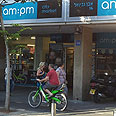
'Some of us even leave our shopping for Shabbat.' Supermarket open 24/7 in Tel Aviv
צילום: עמית קוטלר
Don't touch our Shabbat
Op-ed: Court ruling creates opportunity to stop Tel Aviv Municipality from using Shabbat as profit machine
"Just go to Tel Aviv" is religious coercion fans' favorite way of dealing with almost every demand in regards to state and religion in Israel. They sent us to Tel Aviv when we fought against closing streets in Jerusalem, when we struggled to prevent forced segregation between women and men on buses in Ashdod, and when we opposed the religious radicalization in Beit Shemesh.
Tel Aviv-Jaffa has become a synonym for secularism in Israel, and symbolizes the values of freedom and pluralism more than any other city. A city where we can live as seculars without being suspected of trying to irritate someone. A city where going to the beach or to the cinema or sitting in a café are part of the characteristics of its Shabbat.
And suddenly, really unexpectedly, and without most of us being aware of it, the High Court of Justice has ruled that the Tel Aviv Municipality will have to enforce its own bylaw and will be forced to prevent the opening of supermarkets and other businesses on Shabbat.
When you read it for the first time it sounds shocking, basically going back in time to an era no Tel Aviv resident would like to live in. Most of us have gotten used to always being able to stop by the nearby supermarket for something small, and some of us even leave our shopping for Saturday because we're really busy during the week. The Tel Aviv Municipality's bylaw does not just apply to the closing of supermarkets, but also to cafés, cinemas and other businesses which are part of the Tel Avivian Shabbat.
Going back 30 years and a total closure of Tel Aviv is obviously out of the question, but contrary to the initial instinct – the High Court ruling on the Tel Avivian Shabbat actually opens up quite a few options. First of all, it forces the Tel Aviv Municipality to determine the meaning of the Tel Avivian Shabbat, its borders, what stays open and what is closed. It requires our politician to make a decision on the fundamental tension between the Jewish Shabbat and the commitment to workers' rights and freedoms of the individual in a democratic society.
No escape from changing bylaw
In the new situation created, the Municipality will have to change the anachronistic law binding us to the status quo, a law which has nothing at all to do with the Tel Avivian Shabbat, as Justice Miriam Naor says in her ruling: "If the character of the city of Tel Aviv-Jaffa requires, in the opinion of its leaders who represent the population, not closing businesses on Shabbat, the bylaw can be changed in a legal manner. But as long as the bylaw has not been changed, it must be upheld."But beyond that, and just as importantly, it puts an end to the absurd situation in which the Tel Avivian Shabbat has turned into an economic mechanism yielding profit to the Municipality through weekly fines imposed on anyone opening a business on Shabbat. This mechanism gives a clear advantage to those capable of paying the fines over the small businesses fighting for their economic survival. It also creates basic damage by failing to maintain the hours of work and rest of small family businesses, which cannot afford to hire additional workers and are therefore forced to work 24/7 if they wish to compete against the large supermarket chains.
So there is escape from courageously changing the bylaw in order to legally allow a Tel Avivian Shabbat, a Shabbat which is neither secular nor religious, a free and fair Shabbat. A Shabbat with public transportation, in which cultural and entertainment institutions are open and some consumption – yet not unruly – is allowed, guaranteeing that we can buy milk or a watermelon on our way to the beach.
At the same time, we must enable proper protection of workers' rights, including appropriate payment and an alternative day of rest for those working on Shabbat.
Mickey Gitzin is the executive director of the Israel Hofshit (Be Free Israel) movement and a candidate for the Tel Aviv-Jaffa City Council on behalf of Meretz










